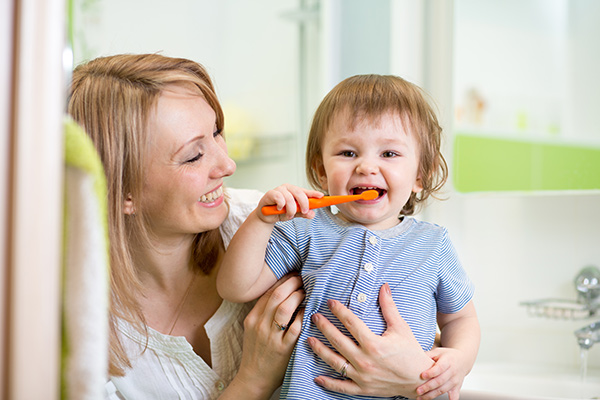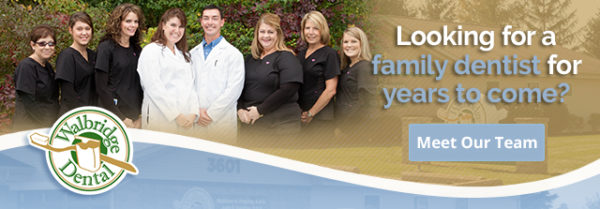
Few things are as important as the health of your baby. In addition to the numerous pediatrician visits that you’ve undoubtedly scheduled, it’s important not to forget that your baby’s oral development will impact their whole lives. As your child reaches six months, it’s time to start thinking about the baby’s first dental checkup.
When to Schedule Your Baby’s First Dental Checkup
Knowing when to schedule your baby’s first visit to the dentist is simple. When their first tooth appears, give your dentist a call. Typically, babies develop their first teeth between six months to a year. However, some children don’t develop their first tooth until after their first birthday. If your child reaches their first year without a tooth appearing, it’s still a good idea to schedule their first appointment.
The first teeth to come in are usually the lower central incisors, which are their lower front teeth. Keep an eye open for these teeth to erupt. As soon as they do, contact us to schedule an appointment!
What to Expect for Your Child’s First Dentist Visit
The first visit for your baby is often a short one and typically won’t involve much beyond a simple examination. It does, however, give your child a chance to meet the dentist and become familiar with the dentist office.
Your dentist will look for any signs of decay in your child’s visible teeth. Additionally, the dentist will look at different parts of their oral development to identify early signs that long-term treatment may be necessary. Some of the things they look at are:
- Bite
- Gums
- Jaw
- Oral Tissue
Depending on the examination, your dentist might recommend that your baby receive a teeth cleaning and possibly even fluoride to prevent cavities.
You will also be educated on important dental care basics for your child. If the dentist believes your child may be at risk for developmental issues with their jaw, teeth or gums, they will also help you learn how to keep an eye on them between visits.
How to Prepare for a Baby’s Dental Appointment
Inform Your Dentist About Medical Conditions
If your child is on any sort of medication or has any medical conditions, let your dentist know. Your dentist needs to know what to expect when working with your child, especially if something is out of the ordinary.
Your dentist may have questions for your child’s pediatrician. Keep the number handy just in case!
Beware of Forming Bad Habits
At their first visit, it’s likely that your child has a thumb sucking habit or uses a pacifier or bottle. Keep an eye on this behavior. It can impact the development of your child’s jaw or teeth. If your child falls asleep with a bottle, it can increase their chance tooth decay.
Any of these habits should be mentioned to your dentist. It will help them stay alert for potential signs that those habits are negatively impacting your child’s dental health.
Scheduling Your Next Visit
After your child’s first tooth appears and they’ve been in for a visit, they’ll need to visit the dentist regularly. Just like your own checkups, plan to bring your child in for dental visits every six months.
Of course, if you discover any indication of cavities or if your child shows unusual signs of pain that aren’t related to teething, schedule an appointment right away.
Why Is It Important to Take Care of Baby Teeth? Won’t They Fall Out Anyway?
The significance of a child’s early dental development can’t be overstated. Some parents believe that since these teeth will fall out on their own, that they don’t require the same care and attention that permanent teeth do. This couldn’t be further from the truth.
Healthy baby teeth contribute to many aspects of their future life:
- They encourage good nutrition due to proper chewing
- They save space for adult teeth to prevent crooked or crowded teeth
- They prevent poor positioning that can increase the likelihood of gum disease
- Teeth play a critical role in speech and speech development
For these reasons, you shouldn’t consider your child’s baby teeth any less important than their permanent, adult teeth.
Teach Your Child How to Brush Their Teeth Early!

Your child can start learning how to brush their teeth very early on, right as their first teeth erupt! This will introduce them to the experience and importance of brushing, making it much easier when they visit the dentist or start brushing their teeth on their own at an older age.
When you first start, don’t use any toothpaste. With just water and a soft-bristled brush, gently brush your child’s teeth and gums. As they reach age two and beyond, you can start using small amounts of toothpaste while they brush.
While it will be difficult to begin, your child will grow accustomed to this habit over time. It’s much easier to teach them this healthy habit early – as well as getting them used to the feeling. As they grow older, it will help you keep your children cavity-free!
Contact Walbridge Dental
Do you need dental sealants? We can help! If you want to prevent cavities or just need information, the professionals at Walbridge Dental provide complete family dental care to families in the Millbury community. Contact us online to set up an appointment now or call us at 419-836-1033.
Connect on Social Media!

